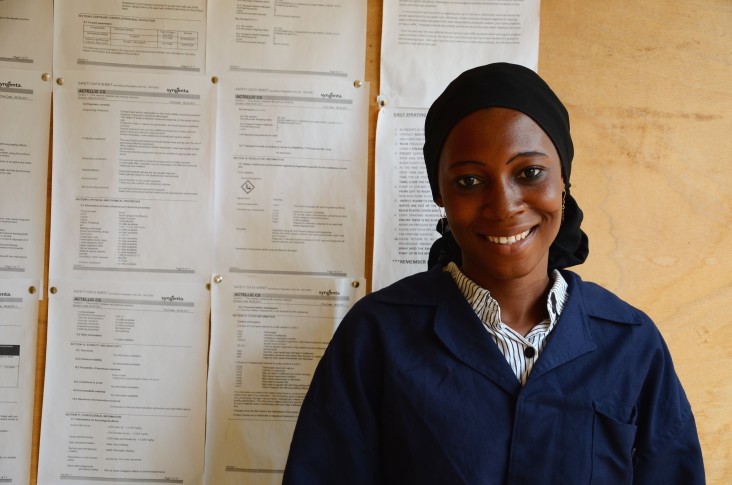
Kubura Sulemana is a store keeper for the Africa Indoor Residual Spraying project in northern Ghana. The project protects millions of people in Africa from malaria by spraying insecticide on the walls, ceilings and other indoor resting places of mosquitoes that transmit malaria. Here, Sulemana tells her story:
Where I live in Savelugu in the north of Ghana, people work as farmers or petty traders. Many of them see a woman’s place as in the house, taking care of children. However, I wanted to work.
I recently began my first job working for the USAID indoor residual spraying (IRS) project as a store keeper. Many people in my community get sick from malaria, some even die. IRS is the spraying of the interior of homes with insecticide that kills mosquitoes that transmit malaria. My family and all our neighbors have their homes sprayed so we will not get sick.
As an IRS store keeper, I take careful records of inventory of project equipment. I make sure that all the materials are in stock and insecticide is kept in a safe, secure place.
I can still remember how excited I was to receive my first paycheck. I was disciplined and invested half of my wages in slippers that I resell at the local market for a profit. I shared the rest of my pay with my parents to help them take care of my nine brothers and sisters.
Although I am the only one of my female friends with a job, I’m hopeful that career opportunities for women in Ghana will expand. When I have a family of my own, my dream is for my daughter to receive a good education so she can get a steady job and provide a better life for her family.—Kubura Sulemana
The Africa Indoor Residual Spraying project (AIRS) is funded by the President’s Malaria Initiative (PMI). Launched in 2005 and led by USAID, the PMI is a five-year, $1.2 billion U.S. Government program, which aims to reduce the malaria burden and relieve poverty in Africa. Specifically, PMI strives to reduce malaria-related deaths by 50 percent in 19 high-burden countries—protecting approximately 450 million people.
AIRS hired approximately 350 women to work as seasonal employees during the 2013 IRS campaign in Ghana. Although women make up only about 18 percent of seasonal staff, the project plans to hire more women in the future. Osman Alhassan, a spray operations coordinator who supervises Sulemana, said two of the three store keepers in his district are women, and that he’s found female staff to be reliable, hardworking and detail-oriented.
Studies show that empowering women has a ripple effect. Women who control the family income are more likely to invest in education and health care. According to The World Bank, providing education and job opportunities for women leads to increased economic productivity, more representative policies, and better development outcomes for the entire community.







Comment
Make a general inquiry or suggest an improvement.